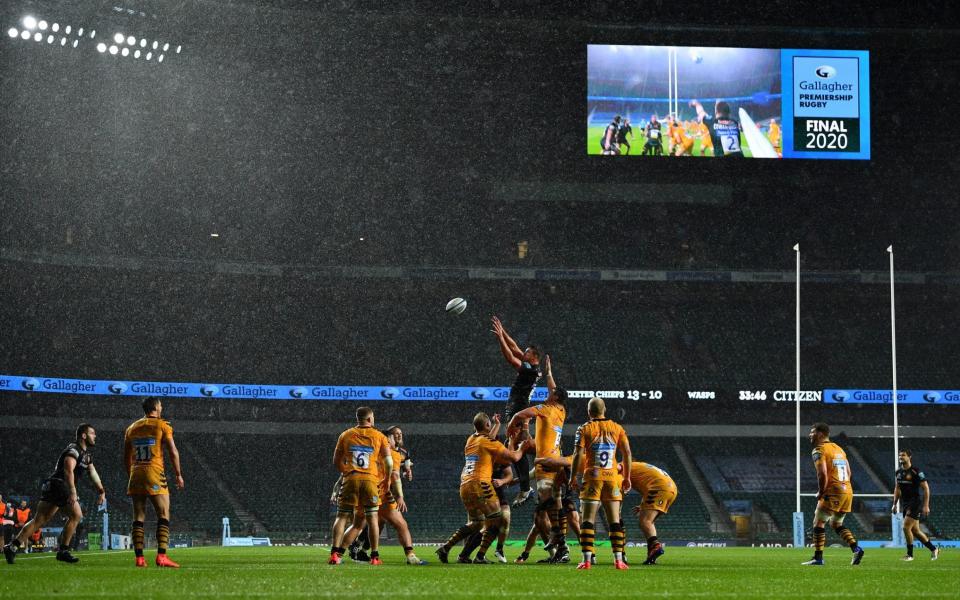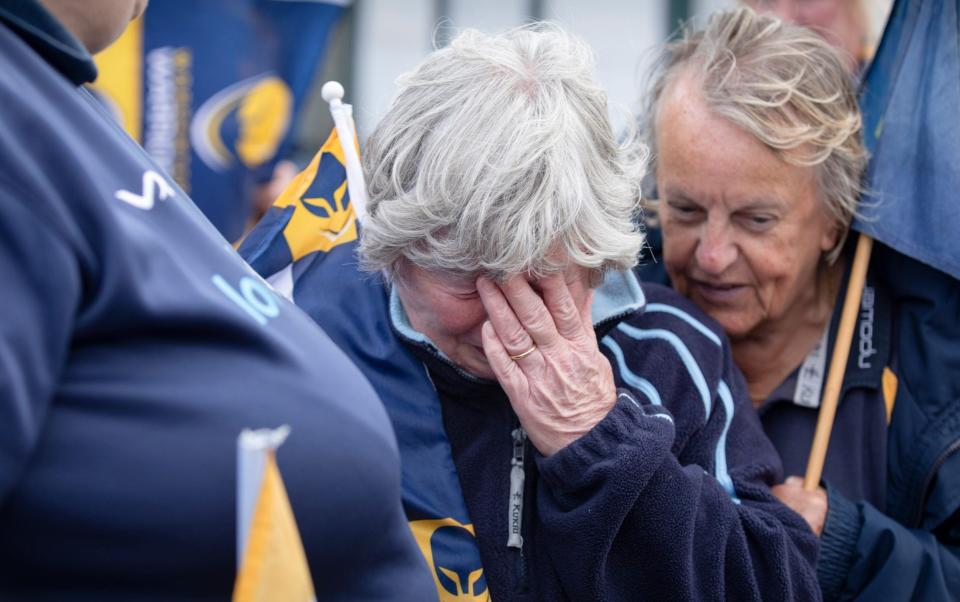Is rugby doomed? Why the game's kingpins are so divided on an existential crisis

Rugby union is in permacrisis. Less than three decades since turning professional, the game feels under siege like never before amid a toxic cocktail of controversy, calamity and scandal that has left clubs, players and supporters in open revolt.
Plagued by bad news, from the collapse of Wasps and Worcester Warriors, to major sexism, racism, bullying and corruption scandals, to multimillion-pound lawsuits brought by former players over brain injuries, it is now fighting a mutiny over a seismic change to the tackle law critics have branded the final nail in the sport’s coffin.
Reports of its demise may prove greatly exaggerated. The Six Nations, which starts this week, will be among the best-attended and most-watched events of the year, as will a World Cup that promises to be the biggest ever, while last year’s women’s tournament was widely regarded as game-changing for the sport.
But all this, and other causes for optimism, do not alter the fact that the game feels increasingly in a fight for its very existence, inevitably raising the question: is rugby doomed?
'It's not been a great year for rugby... the whole thing needs ripping up'
Among those to have warned of its demise has been Nick Easter, who posted #deathofthegame on Twitter in response to the Rugby Football Union’s announcement it was banning tackling above the waist at amateur level. The former England and Harlequins number eight was also defence and forwards coach at Worcester when they were plunged into administration and is now director of rugby at National League One side Chinnor RFC.
“It’s not been a great year for the game, has it?” he joked, before stressing he was serious when he aired his “concerns” about the fate of the sport. Those have only deepened in the aftermath of the bombshell announcement of arguably the biggest change to the way rugby is played since the game became professional. Warnings that banning tackles above the waistline would lead to players quitting the game proved prophetic, with Easter saying two members of his Chinnor squad told him they would do just that. He added of the law change: “They’ve legally been forced to change it, haven’t they, really, with all the lawsuits going on?”
Easter gave an equally blunt assessment of the overall state of the game and why it had become so beleaguered. “The whole thing needs ripping up and redoing,” he said. He pinned much of the blame on its failure to prioritise quality over quantity, from the number or scheduling of fixtures to the overall player and fan experience. “Less is more,” he said, comparing rugby’s business model unfavourably to that of American football.
Branding some of those running the game “incompetent”, he said: “A lot of them are obsolete. They’re not open-minded enough with their views, they’re not experimental enough and, sometimes, they think no change is better. They don’t want to be the one to zag when everyone’s zigging in case they get ousted. Other people are just nodding their heads like the Churchill dog saying, ‘Yeah, yeah, yeah. But as long as I’m all right, Jack’, without a thought for the game.”
He added: “It’s only when it gets so bad and so desperate that they get off their a---- and make a change.”
It does not get much more desperate than the collapse of Worcester and Wasps. That, and the fallout from it, was recently the subject of a damning report by MPs, one of whom proclaimed the elite game in England was “in disarray”.
'We were screwed over by owners who never had rugby in their interest'
Matt Kvesic was coached by Easter at Sixways. He was among the players there fortunate enough to remain a professional after being picked up by Zebre Parma.
“The game’s on a bit of a knife-edge,” said Kvesic, who admitted being “nervous in the sense that it seems to be one thing after another at the moment”. He added: “Do I think rugby’s doomed? No. I think there is a solution but it’s going to take a lot of time.” That solution, according to the flanker, is attracting the right sort of investment – “We were screwed over by two owners who never had rugby at the heart of their interest in the club” – and making the sport more appealing. “Certain things don’t help that,” he said. “Like drastically changing these rules the other week that came seemingly out of the blue.”

For Christian Day, voices like Kvesic’s have for too long been ignored within the game.
“We’ve been through some really, really challenging times,” said the former Northampton lock, who was recently elected general secretary of the Rugby Players Association.
“We can’t sit still. If we sit still, other sports will overtake rugby union. That’s a fact of life.”
Key to avoiding that, according to Day, is making players “partners in the game”. He added: “It is all about being willing to listen, perhaps, to non-traditional voices in the game and look at ways of growing and adapting and innovating.”
Sweeney: 'Rugby's future is bright'
The RFU’s abject failure to consult amateur players before banning tackles above the waist is precisely what triggered the eruption of arguably the biggest backlash to any of the crises engulfing the sport.
What does its chief executive, Bill Sweeney, make of talk about the game’s demise?
“I feel that rugby’s future is actually bright,” said Sweeney when asked if its “torrent of issues” had become an existential threat. “You might think I’m deluding myself or you might think that’s expected for me to say.”
He added: “There are some days when you think, ‘Oh God, not another thing we’re going to have to deal with’. But we just knuckle down and get on with it.”
For how long Sweeney will be allowed to “get on with it” is unclear. He was already facing calls to resign following the collapse of Wasps and Worcester, which have only grown in the wake of the RFU’s humiliating apology for its botched handling of the tackle law change.

Reflecting on a fiasco that has left him facing a vote of no confidence at a special general meeting, Sweeney said: “We’re happy to actually hold our hands up and say, ‘Maybe we should’ve handled this differently’.”
But he stood firm over the basis for the law change, a combination of what he called overwhelming “scientific evidence” and “lawsuit challenges” by brain-injured former players. He added: “You can’t just be in possession of that information and do nothing.”
Far from killing the game, reducing the legal tackle height is one of several measures Sweeney hopes will safeguard its future. Acknowledging “pressures around participation levels” that had been compounded by the coronavirus crisis, he said: “Kids now have more choices available to them in terms of how they spend their free time. They’re less willing to commit to perhaps training sessions during the week and how much time it takes up to play an organised team sport. So, we know that, in order for the game to thrive and the game to grow, we have to be more reflective of what society wants.”
A failure to get it right at grass-roots level will merely compound an ongoing crisis in elite rugby in England, which has already led to the collapse of two of the country’s biggest clubs and has threatened to see more go to the wall.
Sweeney admitted the RFU had not had “the necessary regulatory vehicles in place to be able to intervene” when it came to the downfall of Wasps and Worcester but promised this was now being addressed.
Massie-Taylor: 'I'm excited about the future'
Simon Massie-Taylor was brought in to clean up the mess Premiership clubs found themselves in post-pandemic. The loss of two of them is a damning indictment on the game given top-flight teams were bailed out by the Government to the tune of £124 million, more than any other professional sports league. That bailout was also a loan, which will need to be repaid by clubs who would have gone to the wall without it. They are living on borrowed time.
“Is rugby doomed?” said Massie-Taylor, appointed Premiership Rugby chief executive just over a year ago. “No. I’m very confident and excited about the future.”
It includes that of the Premiership itself, with Massie-Taylor putting his faith in a rescue plan that includes cutting it to 10 teams, aligning it with the Championship, and introducing a sporting commission and financial monitoring panel. But none of this works while clubs continue to lose millions of pounds a year.
“My number one job is to create a platform that attracts future investors and continues to grow the sport,” Massie-Taylor added. Already a major challenge during a recession and cost-of-living crisis, the reputational damage that has been inflicted on the game has made that all the harder. One potential investor is known to have been put off by the recent report by MPs that accused Massie-Taylor of a “very complacent belief” that plans to increase revenues and improve collaboration would solve annual losses averaging around £4 million per club.
'I think there is significant change'
Saracens are one of those clubs, and their chief executive, Lucy Wray, warned that talk of rugby being doomed risked becoming a “self-fulfilling prophecy”. Describing herself as “glass half-full”, she argued it was “an incredibly exciting time” for the sport, particularly in the women’s game.
She added: “Yes, there are some difficulties, but I think they’re being worked through and I think there is significant change. And a lot of this comes because people don’t like change. But change is happening.”

It is not just in England that rugby is beset by major crises. The exposure of a shocking sexism, racism and homophobia scandal at the Welsh Rugby Union has cast a huge shadow over the start of the Six Nations, resulting in its chief executive Steve Phillips handing in his resignation at the weekend. And the build-up to the World Cup in France has been thrown into chaos by bullying and corruption scandals. The rot extends right to the very top of the game, with World Rugby’s own vice-chairman, Bernard Laporte, having recently been convicted of a string of corruption charges. Laporte stood down as the French Rugby Federation president last week.
'Doing nothing is not an option'
Alan Gilpin is the most powerful executive in the sport. World Rugby’s chief executive, it is his job to keep watch on the overall health of the game.
“I don’t think, globally, the sport’s under siege,” he said. “The reality is every sport that is sufficiently global has always got challenges in one part of the world or another, and that’s certainly the case for rugby. And maybe that’s as a result of the growth we’ve experienced.”
That growth recently saw Egypt, Syria and the Democratic Republic of Congo become associate members of World Rugby, while Gilpin also pointed to last year’s Women’s World Cup being the “most successful event in the history of women’s rugby” and “unprecedented demand for tickets” for this year’s men’s equivalent.
World Rugby is also poised to launch a global law trial of a lower legal tackle height as part of a wider drive to win over those who see the sport as unsafe.
“One of the things that rugby needs to do better, globally – and it’s good in some parts of the world and not so much in others – is make sure we’re attracting everyone who wants to play rugby,” Gilpin said. “So, let’s make sure we’ve got a non-contact version of the sport for everybody. We lose too many people as participants in rugby at the point where they might have decided that, ‘Actually, this level of contact is not for me’.”
Warning that “doing nothing is definitely not an option”, he added: “If we can get it right, it can be the making of the sport.”

 Yahoo Sport
Yahoo Sport 





































